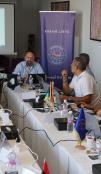Back home: EU-IOM joint initiative supports safe return of migrants

The COVID-19 pandemic had put a long hold on the Voluntary Humanitarian Return flights from Libya. After a five months suspension, the flights resumed last August. Since then, six charter flights took more than 800 migrants from Ghana, Mali, Bangladesh, India and Sudan safely back to their home countries.
"I went to Libya to find better work opportunities, but it wasn't what I expected because of the war.” Abdulmanan Adam, a 26 year old Sudanese, expressed his frustration. As he could not find stable work he decided to return to Sudan.
The story of Rogerson Babatgre from Ghana is different. He worked as a construction worker in Libya for seven years to be able to pay his children’s school fees. But he was seriously injured in a traffic accident. “As I can no longer work like before, I decided to return to my country regardless of the fact that I did not earn enough money for my children’s tuition fees. But that is life. Now I'm very happy that I will see my family after seven years. It was very hard to stay far from them under this situation.”
Syed Khan from Bangladesh survived a deadly attack in Mizdah (Tripoli). After his recovery, which took four months, he decided to return home. For Neiman Ali Adam, 35 year old, the crisis in Libya pushed her to leave after 15 years. She had come to Libya with her husband who was working in the country. After his passing away, she decided to go back to her home country Sudan with her children.
Conflict and COVID-19 have severely impacted the livelihoods of migrants in Libya. IOM reports that as many 93% of migrants were negatively affected by movement restrictions, losing their jobs and many of them struggling to feed their families.
Over 3000 migrants in Libya are currently registered on the VHR programme. Since the launch of operations in Libya in 2015, migrants recived assistance in returning to their countries of origin. Until the end of 2020, 7 more VHR flights are foreseen to take place.
Upon their return, many migrants face the harsh reality of reintegrating into their communities and recreating a livelihood. The EU-IOM Joint Initiative for Migrant Protection and Reintegration offers support to these returnees. Such support ranges from vocational training, over the provision of materials and equipment to start a business, to psychological support.
The VHR programme is funded by the European Union Trust Fund (EUTF) and implemented by IOM through the EU-IOM Joint Initiative for Migrant Protection and Reintegration with the objectives to save lives, protect and assist migrants along the Central Mediterranean Routes.
Read more about the EU-IOM Joint initiative, here: https://migrationjointinitiative.org/countries/north-africa/libya





